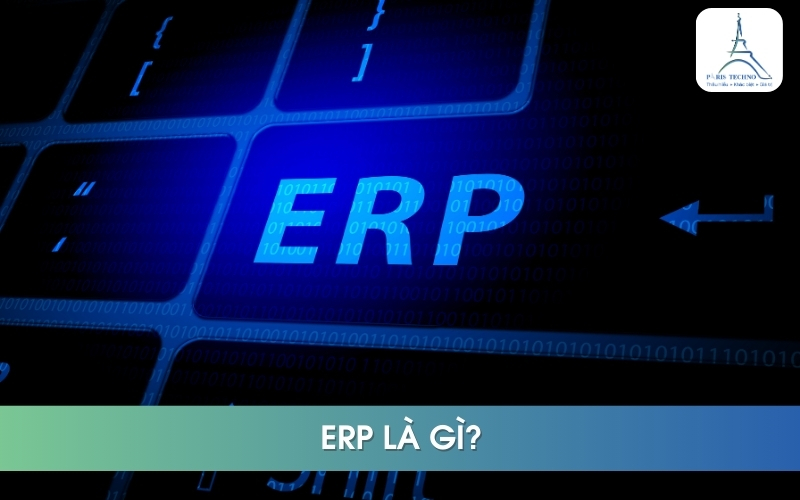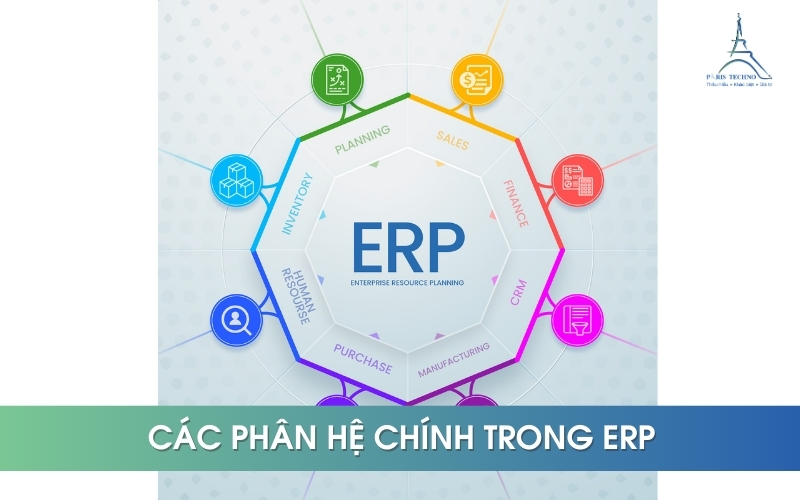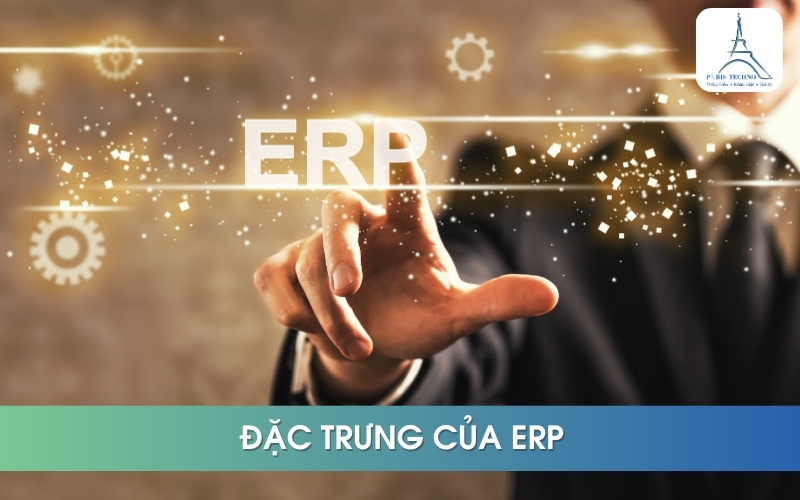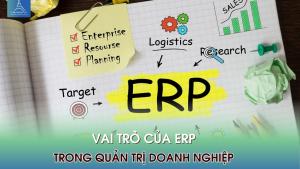ERP is not only a management system, but also an important foundation to help businesses grow strongly and maintain sustainability in today's competitive business context. In this article, Paristechno will introduce the outstanding benefits that ERP systems can bring, helping businesses improve operational efficiency and optimize processes.
What is ERP software?

ERP (short for Enterprise Resource Planning) is an enterprise resource planning system, a technology solution that integrates all core management aspects into a single platform. With the ability to integrate many different applications in the form of modules, ERP acts as an "all-in-one" tool, automating operations and optimizing the management of business resources.
The core goal of ERP software is to build a unified data system that spans all departments and processes, from purchasing, manufacturing, human resources, to sales, customer service, and financial operations. This not only helps improve performance, minimize errors, but also enables businesses to make data-driven strategic decisions.
See also: What is Enterprise Resource Planning - ERP?
An ERP system usually includes the following main subsystems

- Financial Accounting (Finance): Ensure comprehensive financial management, from general accounting, cost management, budgeting, to cash flow tracking and financial reporting.
- Production Planning and Control: Helps businesses plan production effectively, track production progress, manage raw materials, and ensure production process optimization.
- Purchase Control: Support procurement process control, supplier management, and order tracking, from requisition to payment.
- Sales and Distribution: Integrate order management, warehouse control, shipping, and customer care functions to optimize sales and product distribution processes.
- Project Management: Track and coordinate projects from initiation to completion, with detailed management of budgets, resources, and schedules.
- Human Resource Management: Focus on recruiting, training, timekeeping, payroll, and employee performance management, helping to build a strong workforce.
- Service Management: Assist businesses in providing after-sales service, handling support requests, and monitoring service performance to enhance customer experience.
- Stock Control: Integrate real-time inventory tracking tools, manage inbound and outbound quantities, and optimize storage space.
- Tax Reports: Support businesses in preparing and submitting tax reports on time, complying with legal regulations, and minimizing errors in calculation.
- Management Reporting: Provide multi-dimensional reports and analysis, supporting managers to make quick and accurate strategic decisions.
Features of ERP business management software

To differentiate itself from other business management solutions, ERP software possesses four main characteristics as follows:
- Unified production and business management system:
ERP connects all members, departments and stages in the enterprise into an organized and orderly chain of production and business activities. - Tools to support rather than replace labor:
ERP is not an automated production line but a supporting software that helps people optimize work efficiency without eliminating their role. - Management system based on specific rules and plans:
ERP operates according to clearly established principles and plans. Personnel need to be assigned specific tasks and strictly follow regulations; production and business plans are established on a weekly, monthly, or annual basis. - Bridge between departments:
Instead of having departments operate in silos, ERP enables departments to coordinate, communicate and collaborate effectively, promoting cohesion across the enterprise.
See also: Construction business management solution - ERPcons
Benefits of ERP for businesses
With the ability to integrate data from departments, ERP creates a unified management platform, supporting businesses to automate processes, minimize errors, and enhance the ability to make decisions based on accurate data. Not only saving time and costs, ERP also promotes internal collaboration, improves customer experience, and increases competitiveness in the market.
ERP helps control financial information

Financial information often has to be aggregated from many different departments, leading to the possibility of data discrepancies. However, with an ERP solution, all financial data is integrated into a single platform, synchronized across departments and facilities. When there is any change, the system automatically calculates and updates all relevant data to ensure accuracy, minimizing potential risks in financial management.
In particular, thanks to the support of ERP, large-scale and complex businesses do not need to wait until the end of the month or quarter to summarize data. Just by accessing the system, leaders can easily view financial data updated in real time, quickly meeting the necessary information needs.
ERP giúp tăng tốc độ công việc
As businesses grow, workflows become more complex, with more steps and layers that resemble a multi-layered network. The speed of workflow depends on two main factors: knowing exactly where to move data and overcoming obstacles in the transfer process.
For example, in the process of transporting goods from warehouses to business establishments, a decision updated on the ERP system will quickly reach the warehouse keeper without going through many intermediate steps. By minimizing obstacles and narrowing geographical distances, ERP helps businesses optimize processes and effectively speed up work rotation.
ERP helps reduce errors when multiple people enter the same data.

Many businesses struggle with data being misdirected as it passes through different departments. These errors not only slow down work, but also damage the company’s reputation, reduce transparency, and even cause internal conflicts.
With an ERP system, data only needs to be entered once by the first person and stored directly in the system. All other employees in the business will have access to this original data instead of having to use manual copies that are prone to errors, thereby ensuring accuracy and consistency throughout the entire process.
ERP helps to easily control employee work process
A centralized database system along with a fixed-flow business process design helps businesses easily and effectively deploy internal control mechanisms.
ERP's tracing feature helps businesses quickly identify the source of issues that need to be checked, and clearly identify related personnel, helping to handle them promptly and improve transparency in management.
In addition, monitoring each employee's work is also optimized. Managers only need to be in one place, open ERP to be able to grasp all the work results of all employees from the smallest numbers.
ERP system with comprehensive management capabilities and tight integration is an effective solution in business administration. By optimizing and cutting costs in the operation and implementation stages, ERP helps businesses save significantly in both costs and resources, while improving operational efficiency.

